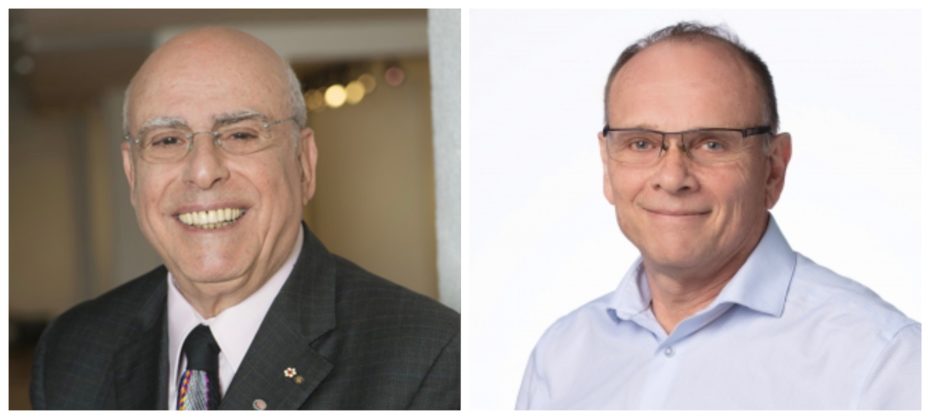
On June 20, at the National Assemblée du Québec, the Premier of Quebéc, Francois Legault, celebrated the 35 people inducted or promoted within the Ordre National du Québec.
Dr. Phil Gold, the Douglas G. Cameron Professor of Medicine and Professor of Physiology and Oncology, was promoted to Grand officier, the highest rank of the Ordre.
Dr. Philippe Gros, Deputy Vice-Principal (Research and Innovation) and Professor of Biochemistry, became a Chevalier.
Additionally, McGill Faculty of Medicine alumni Dr. Daniel Borsuk and Dr. Laurent Duvernay-Tardif (of the NFL’s Kansas City Chiefs) were inducted as Officier and Chevalier respectively. Former McGill adjunct member of the Department of Experimental Medicine, Trang Hoang, and Claude Montmarquette, doctor of Laws, honoris causa, were appointed Officiere and Officier.
“McGill University is proud that the Government of Quebéc has chosen to honour Drs. Gold and Gros, both of whom have made outstanding contributions to Quebec’s rich culture of research excellence and to the health and well-being of its citizens,” said Martha Crago, Vice-Principal, Research and Innovation. “My sincere congratulations to all those inducted and promoted today to L’Ordre national du Québec.”
Phil Gold: a caring physician, humanitarian, gifted teacher and inspirational leader
Born in Montreal, Dr. Phil Gold has lived, studied and worked in the city for most of his life. Dr. Gold obtained a BSc in Honours Physiology in 1957 and an MDCM and an MSc degree in Physiology in 1961, all at McGill. From 1963 to 1965 he spent time in the laboratories of the McGill University Medical Clinic of The Montreal General Hospital (now the Montreal General Hospital Research Institute) obtaining a Ph.D.
Dr. Gold’s co-discovery of the Carcinoembryonic Antigen (CEA), along with the description of alpha-fetoprotein at about the same time, ushered in the modern era of human tumour marker research along with the broad ramifications that this work has had over the past five decades. His discovery represented the first clinically-useful human tumour marker and one that is found in 70 per cent of cancer patients. He has served as Chairman of the Department of Medicine at McGill and Physician-in-Chief at the Montreal General Hospital. He is presently the Executive Director of the Clinical Research Centre of the McGill University Health Centre.
He was the first Director of the McGill Cancer Centre, now the Goodman Cancer Research Centre, which was established in 1978 in large part due to the impact of Dr. Gold’s research. The Centre remains today one of the top cancer research institutes in the country. At McGill, his reputation for research is matched by his devotion to teaching and philanthropy, having establishing national programs aimed at training the next generation of clinician-scientists, and devoting himself to raising significant funding for the medical community.
Dr. Gold has been the recipient of numerous international awards and been elected to many prestigious scientific organizations. National, provincial and local recognition includes being made a Companion of the Order of Canada (1986), an Officer of l’Ordre nationale du Québec (1989), and a member of the Academy of Great Montrealers (1986). He received the Gairdner Foundation International Award (with Dr. Freedman, 1978) and the F.N.G. Starr Award from the Canadian Medical Association (1983). Dr. Gold, was bestowed an honorary doctorate by the University of British Columbia on May 22.
Philippe Gros: an expert in genetic research
Dr. Philippe Gros is widely acknowledged as an expert in genetic studies using mouse models, and has greatly contributed to knowledge about the fundamental causes of human illnesses, including genetic susceptibility to infections, predisposition to neural tube defects, and carcinogen-induced cancer. Dr. Gros obtained his Ph.D. From McGill in 1983.
Under his leadership, a research team identified the gene that causes spina bifida, the second-most common birth defect in humans. He has also advanced knowledge regarding genes that give rise to susceptibility to malaria, which affects over 200 million people annually worldwide (WHO). Prof. Gros’s laboratory continues to use genetic models to assist in the development of more effective anti-microbial drugs.
In 2003, he became a fellow of the Academy of Sciences, Life Science Division, of the Royal Society of Canada. In 2008, he received the Wilder Penfield Prize for Health Sciences (Prix du Québec) and in 2009 Prof. Gros was awarded the Killam Prize for distinguished Canadian scholars in the field of health sciences. He is a member of the International Tuberculosis Centre and the Goodman Cancer Research Centre. He also serves as Director of the Complex Traits Program at McGill. He received the Queen Elizabeth II Diamond Jubilee Medal from the Association of Universities and Colleges of Canada from the The Governor General of Canada in 2013.
Read the release here.
